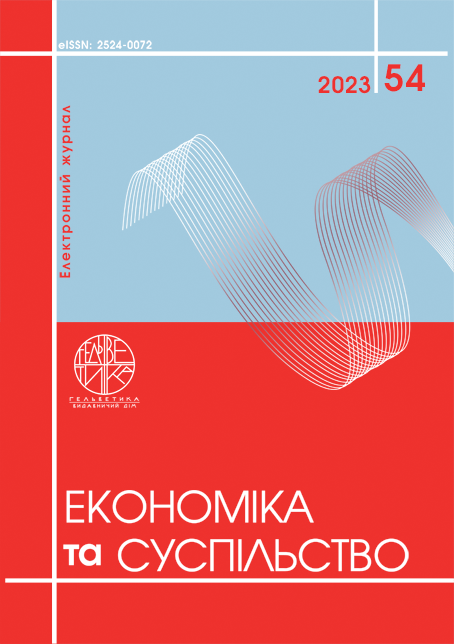MODELS OF CREATING A COMPREHENSIVE ENTERPRISE MANAGEMENT TECHNOLOGY BASED ON THE INTEGRATION OF ITS COMPONENTS
Abstract
The evolution of management science and its practical applications has given rise to comprehensive management technologies – holistic systems that enhance organizational efficiency by structuring and coordinating management functions directed towards the objectives of sustainable organizational development. In contemporary enterprises, a pressing requirement exists to select models for the creating of such technologies through the integration of their elements. This article aims to analyze and systematize the principal characteristics of comprehensive enterprise management technology formation models while substantiating its components, while considering the demands of the modern business milieu. To achieve this objective, the article employs methods of theoretical generalization, analysis, synthesis, and comparative analysis. The examination of existing models for the creation of comprehensive enterprise management technology reveals several distinct categories, including systemic, process-based, synergistic, innovative, complex, and risk-oriented models. Notably, most of these models, with the exception of the risk-oriented variants, do not afford adequate emphasis to the systematic evaluation and administration of risks. Given the contemporary surge in diverse threats, this facet should inherently constitute an integral component of enterprise management technology. Further examination reveals that although existing risk-oriented models for comprehensive enterprise management technology formulation incorporate risk assessment and management, these procedures pertain to the implementation of an integrated management system rather than its day-to-day operation. In response, this article advocates for the adoption of a combined model, one that integrates separate technologies and augments the comprehensive model with a risk-oriented component. In contrast to existing risk-oriented models, this proposed approach calls for the integration of risk assessment and management throughout the entire lifespan of the comprehensive management technology. This inclusive strategy ensures continuous enhancement, heightened process and product quality, stakeholder satisfaction, loss mitigation, and ultimately, the realization of sustainable development objectives.
References
Alherian N., Majstorovic V., Kirin S., Brkic V. S. Risk model for integrated management system. Tehnicki vjesnik - Technical Gazette. 2019. December, рр. 1-11. DOI:10.17559/tv-20190123142317
Asif M., Bruijn E.J., Fisscher O.A.M. Searcy C., Steenhuis H.-J. (2009). Process embedded design of integrated management systems. International Journal of Quality and Reliability Management. 2009. No 26. pp. 261–282.
Asif M., de Bruijn E.J., Fisscher O.A.M., Searcy C. Meta-management of integration of management systems. TQM Journal. 2010. No 22. pp. 570–582.
Bernardo M., Casadesus M., Karapetrovic S., Heras I. How integrated are environmental, quality and other standardized management systems? An empirical study. Journal of Cleaner Production. 2009. No 17. pp. 742–750. https://doi.org/10.1016/j.jclepro.2018.11.066
Bernardo M. Integration of management systems as an innovation: A proposal for a new model. Journal of Cleaner Production. 2014. 82. 132–142.
Chruzik K. Integration model of management systems in Sea Transport. International Journal on Marine Navigation and Safety of Sea Transportation. 2020. No 14. pp. 393–396. DOI: 10.12716/1001.14.02.16
de Souza Barbosa A., da Silva L.B., de Souza V.F., Morioka S.N. Integrated Management Systems: Their organizational impacts. Total Quality Management and Business Excellence. 2022. No 33. pp. 794–817.
Ispas L., Mironeasa C. The Identification of Common Models Applied for the Integration of Management Systems: A Review. Sustainability. 2022. No 14(6). pp. 3559. doi.org/10.3390/su14063559
Ispas L., Mironeasa C., Silvestri A. Risk-Based Approach in the Implementation of Integrated Management Systems: A Systematic Literature Review. Sustainability. 2023. No 15. pp. 10251. doi.org/10.3390/ su151310251
Jørgensen T.H., Remmen A., Mellado M.D. Integrated management systems–three different levels of integration. Journal of Cleaner Production. 2006. No 14. pp. 713–722.
Karapetrovic S., Willborn W. Integration of quality and environmental management systems. TQM Magazine. 1998. No 10(3). pp. 204–13.
Labodová A. Implementing integrated management systems using a risk analysi based approach. Journal of Cleaner Production. 2004. No 12. pp. 571–580.
Martins Y.S., da Silva C.E.S., Sampaio P.A., da Costa Araújo Sampaio P.A., Catalani G. L. ISO 9001: 2015 and risk-based thinking: Scientific research insights. Total Quality Management and Business Excellence. 2022. No 33. pp. 1326–1343.
Masuin R., Latief Y., Zagloel T.Y. Development of integration risk on integrated management system in order to increase organisational performance of construction company. International Journal of Project Organisation and Management. 2020. No 12. pp.164–177.
Mežinska I., Lapin I., Mazais J. Integrated management systems towards sustainable and socially responsible organisation. Total Quality Management and Business Excellence. 2015. No 26. pp. 469–481.
Muthusamy G., Palanisamy C., & Mohanraj M. A. Comprehensive Model and Holistic Approach for Implementing an Integrated Management Systems. Journal of Computational and Theoretical Nanoscience. 2018. No 15(1). pp.392-401. DOI: 10.1166/jctn.2018.7101
Pourrajab V., Eftekhari N., Hashemi S.K. Implementation of an integrated management system for monitoring risks and opportunities: A case study at TAMCO. International Journal of Quality and Innovation, 2019. No 4. pp. 210–231.
Ramos D., Afonso P., Rodrigues M. Integrated management systems as a key facilitator of occupational health and safety risk management: A case study in a medium sized waste management firm. Journal of Cleaner Production. 2020. No 262. pp. 121346.
Rebelo M., Santos G., Silva R. Conception of a flexible integrator and lean model for integrated management systems. Total Quality Management and Business Excellence. 2014. No 25. pp. 683–701.
Rocha M., Searcy C., Karapetrovic S. Integrating Sustainable Development into Existing Management Systems. Total Quality Management & Business Excellence. 2007. No 18:1-2. pp. 83-92. DOI: 10.1080/14783360601051594
Sampaio P., Saraiva P., Domingues P. Management systems: integration or addition? International Journal of Quality & Reliability Management. 2012. No 29. pp. 402-424. doi.org/10.1108/02656711211224857.
Zeng S. X., Shi J. J., Lou G. X. A synergetic model for implementing an integrated management system: An empirical study in China. Journal of Cleaner Production. 2007. No 15(18). pp. 1760-1767.
Zeng S.X., Tam C.M., Tam V.W.Y. Integrating safety, environmental and quality risks for project management using a FMEA method. Engineering Economics. 2010. No 21. pp. 44-52.

This work is licensed under a Creative Commons Attribution 4.0 International License.


